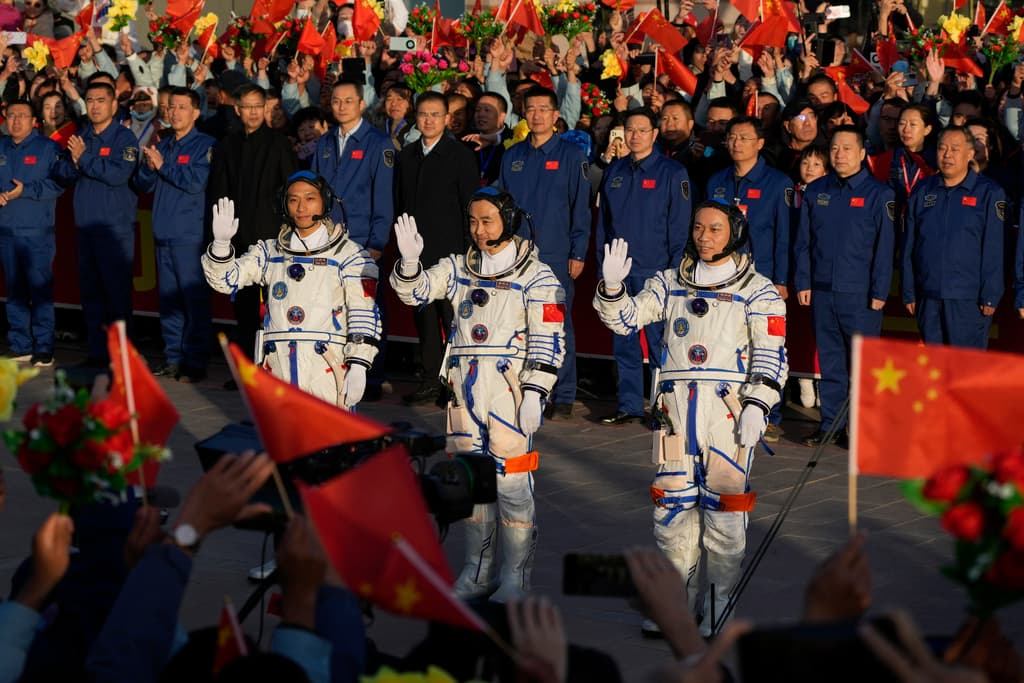Europe Waking Up to Communist China Space Threat While America Struggles
China is accused of seeking to ‘become a national security leader in space, to use space to support military operations … gain space superiority as a domain, especially over the western Pacific.’

The European Space Agency announced that it will not cooperate on the International Lunar Research Station, led by Communist China, nor will it cooperate with the Chang’e-7 or 8 spacecraft, waking up to the space threat from the People’s Republic.
“China can use its access to European technology to undermine them in space, especially France,” the director of the center for defense concepts and technology at the Hudson Institute, Bryan Clark, tells the Sun.
Europe may be noticing that everything seems to be going right for China in its space endeavors.
The country’s Chang’e-6 probe, for which the ESA provided a payload, is set to return to Earth on June 25 carrying lunar rocks, the first ever collected from the far side of the moon. The probe also successfully detected negative ions on the moon — another first.
China’s human spaceflight agency — the China Manned Space Engineering Office — announced its selection of ten new astronauts to be trained at the Astronaut Center at Beijing. Eight of the astronauts are pilots and two are payload specialists, the nation’s first cosmonauts from Hong Kong and Macao.
When viewed in tandem, these successes, among others, are a part of an overarching vision which the People’s Republic seeks to fulfill in the void above.
“China wants to become a national security leader in space, to use space to support military operations … gain space superiority as a domain, especially over the western Pacific,” Mr. Clark said.
“They see space as yet another crucial sector for extending Beijing’s global hegemony,” the director of the quantum alliance initiative at the Hudson Institute, Arthur Herman, told the Sun.
This applies to economic dominance as well. China views “the moon as a potential area for future resources — to mine and use material to further their deep space exploration and to help them economically on Earth,” a senior fellow at the American Enterprise Institute, Todd Harrison, told the Sun.
Whichever nation taps into these possibilities first, Mr. Harrison said, will set the de facto standards for harnessing the moon’s resources. China, therefore, is off to the races.
Furthermore, dominance in space provides the People’s Republic with geopolitical leverage. “China dangles that carrot, says ‘we have an opportunity to do something in space with us,’” the deputy director of the aerospace security project at the Center for Strategic and International Studies, Clayton Swope, told the Sun.
It’s not just about dominance; so too does prestige factor into Beijing’s calculations. “Prestige is what has captured China’s imagination. Success in space is a reflection of China’s success on the world stage,” Mr. Swope said. The optics of becoming the second nation to set human feet on the moon would certainly boost its reputation.
While China advances on the front up above, America is showing signs of struggle in maintaining its edge.
Though the Boeing Starliner’s success effectively ended American dependence on Russia to reach the International Space Station, the spaceship’s return to Earth was delayed until June 18 at the earliest.
The delay was provided to allow for the astronauts on the Boeing Starliner, Suni Williams and Butch Wilmore, to assist in a spacewalk and for engineers to perform systems checks. The Starliner experienced troubles with its thrusters and helium leaks along its journey to the space station.
Today, NASA called off that spacewalk because of a “spacesuit discomfort issue.” On top of that, NASA accidentally broadcasted a simulation of distressed astronauts from the ISS, setting off concern over a real emergency.
“This new generation of American space technology still has teething problems — which is disturbing considering how long we’ve been waiting for it to come out of its government nursery,” Mr. Herman said.
China’s ambitions, and successes, are growing in space. Meanwhile, American enterprises are struggling to maintain dominance in the domain. Europe, at least, is beginning to recognize that competition, not cooperation, will be the future of its space relationship with the People’s Republic.
When asked if China is preparing for war in space, Mr. Herman said, “You bet they are. So is Russia. We need to realize the era of weaponizing space is upon us, and this is a war we can’t afford to lose. Our national security, our economy, our future, depends on who controls space, the next Great Global Commons.”

